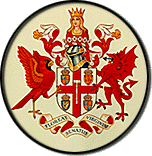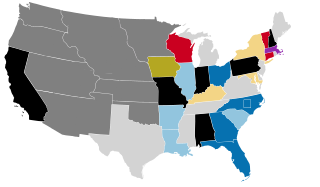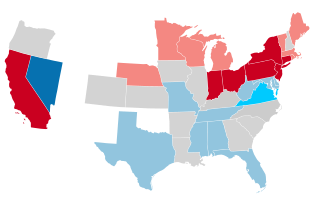| ||||||||||||||||
Washington's 26th state senate district | ||||||||||||||||
|---|---|---|---|---|---|---|---|---|---|---|---|---|---|---|---|---|
| ||||||||||||||||
| ||||||||||||||||
| Elections in Washington |
|---|
 |
A special election was held on November 5, 2013, [1] to elect a senator to fill the rest of Derek Kilmer's term in the Washington State Senate representing the 26th district.
| ||||||||||||||||
Washington's 26th state senate district | ||||||||||||||||
|---|---|---|---|---|---|---|---|---|---|---|---|---|---|---|---|---|
| ||||||||||||||||
| ||||||||||||||||
| Elections in Washington |
|---|
 |
A special election was held on November 5, 2013, [1] to elect a senator to fill the rest of Derek Kilmer's term in the Washington State Senate representing the 26th district.
The seat was left vacant after incumbent Derek Kilmer was elected to the U.S. House in November 2012. Nathan Schlicher was appointed to the seat two weeks after Derek Kilmer was sworn in.
The election was contested between Nathan Schlicher of the Democratic Party and Jan Angel of the Republican Party, who advanced as the top two finishers in the August primary.
| Party | Candidate | Votes | % | |
|---|---|---|---|---|
| Republican | Jan Angel | 8,109 | 56.8 | |
| Democratic | Nathan Schlicher | 6,125 | 42.9 | |
| Total votes | 14,281 | 100 | ||
| Party | Candidate | Votes | % | |
|---|---|---|---|---|
| Republican | Jan Angel | 11,162 | 51.9 | |
| Democratic | Nathan Schlicher | 10,183 | 47.3 | |
| Total votes | 21,517 | 100 | ||
| Republican gain from Democratic | ||||
Jan Angel won the election by about five percent, giving the Republican caucus a 24–25 minority for the 2014 session over previously having a 23-26 minority during the 2013 session.

The Florida House of Representatives is the lower house of the Florida Legislature, the state legislature of the U.S. state of Florida, the Florida Senate being the upper house. Article III, Section 1 of the Constitution of Florida, adopted in 1968, defines the role of the Legislature and how it is to be constituted. The House is composed of 120 members, each elected from a single-member district with a population of approximately 180,000 residents. Legislative districts are drawn on the basis of population figures, provided by the federal decennial census. Representatives' terms begin immediately upon their election.

The House of Representatives of Puerto Rico is the lower house of the Legislative Assembly of Puerto Rico, the bicameral territorial legislature of Puerto Rico. The House, together with the Senate, control the legislative branch of the government of Puerto Rico.

The Senate of Virginia is the upper house of the Virginia General Assembly. The Senate is composed of 40 senators representing an equal number of single-member constituent districts. The Senate is presided over by the lieutenant governor of Virginia. Prior to the American War of Independence, the upper house of the General Assembly was represented by the Virginia Governor's Council, consisting of up to 12 executive counselors appointed by the colonial royal governor as advisers and jurists.

Derek Christian Kilmer is an American politician who has been the U.S. representative for Washington's 6th congressional district since 2013. A member of the Democratic Party, he served as a member of the Washington House of Representatives from 2005 to 2007 and the Washington State Senate from 2007 to 2012, representing the 26th district.

The 1854–55 United States Senate elections were held on various dates in various states. As these U.S. Senate elections were prior to the ratification of the Seventeenth Amendment in 1913, senators were chosen by state legislatures. Senators were elected over a wide range of time throughout 1854 and 1855, and a seat may have been filled months late or remained vacant due to legislative deadlock. In these elections, terms were up for the senators in Class 3.

The 1872–73 United States Senate elections were held on various dates in various states, coinciding with President Ulysses S. Grant's re-election. As these U.S. Senate elections were prior to the ratification of the Seventeenth Amendment in 1913, senators were chosen by state legislatures. Senators were elected over a wide range of time throughout 1872 and 1873, and a seat may have been filled months late or remained vacant due to legislative deadlock. In these elections, terms were up for the senators in Class 3.

The 1868–69 United States Senate elections were held on various dates in various states. As these U.S. Senate elections were prior to the ratification of the Seventeenth Amendment in 1913, senators were chosen by state legislatures. Senators were elected over a wide range of time throughout 1868 and 1869, and a seat may have been filled months late or remained vacant due to legislative deadlock. In these elections, terms were up for the senators in Class 1.

The 1904–05 United States Senate elections were held on various dates in various states, coinciding with President Theodore Roosevelt's landslide election to a full term and the 1904 House of Representatives elections. As these U.S. Senate elections were prior to the ratification of the Seventeenth Amendment in 1913, senators were chosen by state legislatures. Senators were elected over a wide range of time throughout 1904 and 1905, and a seat may have been filled months late or remained vacant due to legislative deadlock. In these elections, terms were up for the senators in Class 1.

The 1878–79 United States Senate elections were held on various dates in various states. As these U.S. Senate elections were prior to the ratification of the Seventeenth Amendment in 1913, senators were chosen by state legislatures. Senators were elected over a wide range of time throughout 1878 and 1879, and a seat may have been filled months late or remained vacant due to legislative deadlock. In these elections, terms were up for the senators in Class 3.

The 1880–81 United States Senate elections were held on various dates in various states, coinciding with the presidential election of 1880. As these U.S. Senate elections were prior to the ratification of the Seventeenth Amendment in 1913, senators were chosen by state legislatures. Senators were elected over a wide range of time throughout 1880 and 1881, and a seat may have been filled months late or remained vacant due to legislative deadlock. In these elections, terms were up for the senators in Class 1.

The 1884–85 United States Senate elections were held on various dates in various states, coinciding with the presidential election of 1884. As these U.S. Senate elections were prior to the ratification of the Seventeenth Amendment in 1913, senators were chosen by state legislatures. Senators were elected over a wide range of time throughout 1884 and 1885, and a seat may have been filled months late or remained vacant due to legislative deadlock. In these elections, terms were up for the senators in Class 3.

The 1890–91 United States Senate elections were held on various dates in various states. As these U.S. Senate elections were prior to the ratification of the Seventeenth Amendment in 1913, senators were chosen by state legislatures. Senators were elected over a wide range of time throughout 1890 and 1891, and a seat may have been filled months late or remained vacant due to legislative deadlock. In these elections, terms were up for the senators in Class 3.

The 1892–93 United States Senate elections were held on various dates in various states, coninciding with former Democratic President Grover Cleveland's return to power. As these U.S. Senate elections were prior to the ratification of the Seventeenth Amendment in 1913, senators were chosen by state legislatures. Senators were elected over a wide range of time throughout 1892 and 1893, and a seat may have been filled months late or remained vacant due to legislative deadlock. In these elections, terms were up for the senators in Class 1.

The 1830–31 United States Senate elections were held on various dates in various states. As these U.S. Senate elections were prior to the ratification of the Seventeenth Amendment in 1913, senators were chosen by state legislatures. Senators were elected over a wide range of time throughout 1830 and 1831, and a seat may have been filled months late or remained vacant due to legislative deadlock. In these elections, terms were up for the senators in Class 3.

The 1860–61 United States Senate elections were held on various dates in various states. As these U.S. Senate elections were prior to the ratification of the Seventeenth Amendment in 1913, senators were chosen by state legislatures. Senators were elected over a wide range of time throughout 1860 and 1861, and a seat may have been filled months late or remained vacant due to legislative deadlock. In these elections, terms were up for the senators in Class 3.

The 1862–63 United States Senate elections were held on various dates in various states, occurring during the American Civil War. As these U.S. Senate elections were prior to the ratification of the Seventeenth Amendment in 1913, senators were chosen by state legislatures. Senators were elected over a wide range of time throughout 1862 and 1863, and a seat may have been filled months late or remained vacant due to legislative deadlock. In these elections, terms were up for the senators in Class 1.
Janice E. Angel is an American politician who served as a member of the Washington State Senate, representing the 26th district from 2013 to 2019. A member of the Republican Party, she previously served as a member of the Washington House of Representatives from 2009 to 2013. She won a November 5, 2013 special election for the 26th district Washington Senate seat, which incumbent Democrat Nathan Schlicher conceded on November 7. After the election was certified on December 4, Angel was sworn in as state senator on December 17.

The 2014 Michigan House of Representatives elections were held on November 4, 2014, with partisan primaries to select the parties' nominees in the various districts on August 5, 2014. Members elected at the 2014 election served in the 98th Michigan Legislature which convened on January 7, 2015.
Nathaniel R. Schlicher is an American Democratic Party politician. He was a member of the Washington State Senate representing the 26th district for exactly eleven months, from January to December 2013. Schlicher was appointed to fill the Senate seat on January 17, 2013 following Derek Kilmer's election as the congressman for Washington's 6th congressional district. Schlicher ran in a special election on November 5, 2013 to complete the remainder of his term as state senator. Schlicher conceded the race on November 7 to his challenger, Republican state representative Jan Angel, who was certified the winner on December 4 and sworn in on December 17.

The 2024 Washington gubernatorial election will be held on November 5, 2024. The top-two primary will be held on August 6.